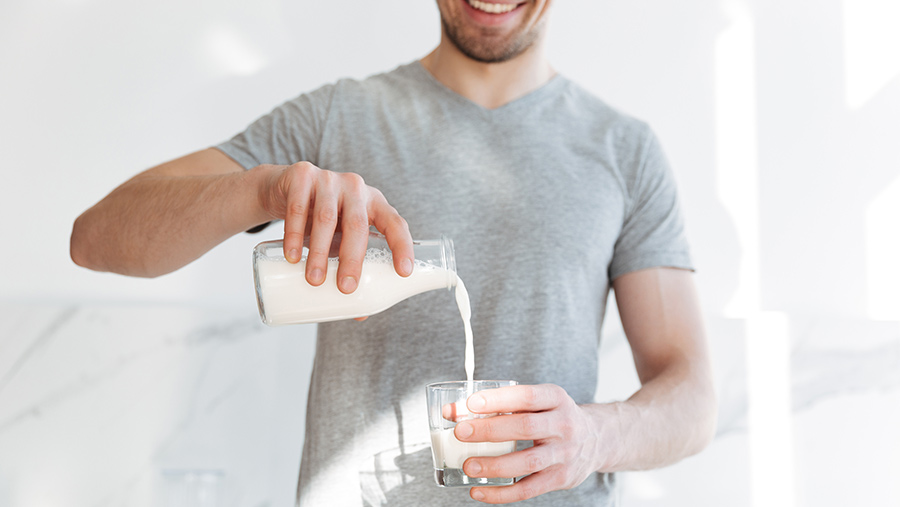Opinion: Time to shout about the many virtues of cow’s milk
 © Drobot Dean/Adobe Stock
© Drobot Dean/Adobe Stock When I was at junior school we got free milk every day, which we drank with varying degrees of enthusiasm.
The lads in the class competed to see who could gulp it down quickest then do the longest, loudest burp.
We vaguely knew it was “good for us”, but if we’d realised just how good we might have treated it with more respect.
See also: Farm leaders vow to overcome vegan dairy shutdown
Were it to be invented tomorrow, milk would be hailed as a superfood.
Most people probably know it contains protein and calcium but, according to the website of the British Dietetic Association (BDA), milk also provides iodine, phosphorus, potassium, riboflavin, pantothenic acid and vitamin B12.
I confess that some of this was news to me.
Given how nutritious it is, it is dismaying to see the woefully dull way most milk is retailed. There it sits in the supermarket, ranks of unexciting plastic bottles imprisoned in metal cages, with little to indicate the wonders within.
The labels, using the sort of tiny print favoured by loan companies to discourage the reading of terms and conditions, are neither inspiring nor particularly informative.
My fridge currently contains own-brand milk from three national supermarket chains.
As well as calcium, the list of nutritional information on one includes B12, but not iodine; on another iodine, but not B12; and the third doesn’t include either.
None lists the other vitamins and minerals referred to by the BDA, which does not help me as a consumer. Are they there or not? Or do the retailers think they aren’t worth mentioning?
If all the benefits of milk are not promoted, the public will not be aware what marvellous stuff it is.
This matters because the fanatics want to stop us having milk at all and it will be easier to do that if we don’t know what we would be missing.
I will be enraged if I can’t buy milk because extremists have poured it onto the supermarket floor or blockaded the processors. And what wondrous elixirs do they want me to drink instead?
A quick browse online indicates that I could have white liquid made with soya, almonds, oats, hazelnuts, coconut, rice or hemp, mostly at prices well above £1/litre. (My supermarket milk was 68p per litre for a four-pint bottle).
If all the benefits of milk are not promoted, the public will not be aware what marvellous stuff it is. This matters because the fanatics want to stop us having milk at all
In addition to water and a small amount of plant material, what you might also get for your money are flavourings, stabilisers, acidity regulators, emulsifiers, oil and salt.
Because they don’t occur naturally in the product, some are fortified with calcium and vitamins; iodine is rarer.
I gather that such things can’t be added to organic products, so one drink I found – for £2/litre – consisted of only “spring water, organic rice, organic Italian almonds (1%), organic cold-pressed sunflower oil, sea salt”.
Some brands make claims about health and the environment as a key selling point, so the packaging may bear a matey message designed to give you the nice warm feeling that you are “doing yourself and the planet a favour!”. Really?
Informed choice is fine, but unless milk blows its own trumpet much louder, people could easily be misled into thinking the imitators are its nutritional equal and end up paying more for less.
I’m sticking with milk – it’s great value, it’s British, and people should be proud to drink it.

